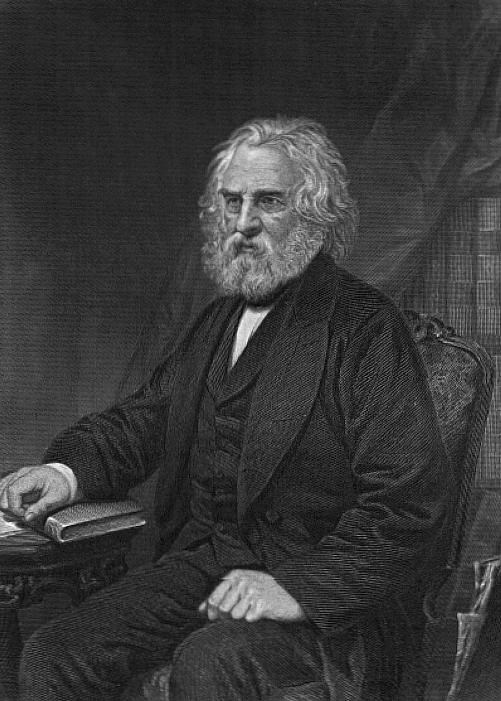 |
| Henry Wadsworth Longfellow |
The fine art of poetry has many ambassadors who, throughout these past hundreds of years, have graced the world with their words. Among these numerous men and woman, Henry Longfellow distinguishes himself from others not only because of his profound poetry but because of the legacy he has left behind. The way that he traces his life with poems is simply marvelous. He seems to have written something to represent every step in his life. Readers may wonder at times if it was not to forget his family and events, or to open the eyes of the people to a different aspect of Life. Whatever the reason, Henry Longfellow has captured the heart and souls of many. A closer look at his life may open our eyes as to what motivated him to write.
Born February twenty-seventh 1807 to Zilpah Wadsworth and Stephen Longfellow, Henry had azure blue eyes and fair hair. At the early age of three, he was sent to school and by the age of six, could read, write and do divisions and multiplications and his professors delighted in him. Although Stephen Longfellow preferred for his son to become a lawyer, Henry seemed much more interested in writing and even established a Chair of Modern Languages at his college of Bourdoin. By the time he had reached his twenty -second birthday, Henry Longfellow was a college professor. He married his sweetheart Mary Storer Potter but she died shortly after on a trip to Europe. After settling as a professor for Cambridge University, he fell in love again with the daughter of his landlord, Frances Appleton, who gave him six children: Charles, Ernest, Fanny, Alice, Edith and Anne Allegra. After twenty years, she died of severe burns leaving her husband heartbroken.
It is interesting to note that Henry Longfellow had among his family and friends some historical personages still famous to America today. When in college, Henry found a great friend in the famous author Nathaniel Hawthorn. Hawthorne even helped him to outline the story of the famous poem by Henry Longfellow entitled, "Evangeline". On his mother's side of the family, this character is a descendant of John and Priscilla Alden who boarded the Mayflower on a voyage to Plymouth, the very first colony! Longfellow consecrated one of his poems, "The Courtship of Miles Standish" in honour of his brave ancestors. His grandfather also served in the Revolutionary War as General Peleg Wadsworth.
Henry Longfellow wrote over one hundred poems in his life, but Evangeline holds his everlasting fame. Published in 1847, "Evangeline" became a favourite for many but especially the Acadian Canadians. The poem expresses the pain they felt about being separated from their loved ones during the revolutionary war. This poet received honorary degrees from the universities of Oxford and Cambridge and both the Prince of Wales and Queen Victoria requested his presence at one point in his life. The people in charge also chose Henry as a member of the Russian Academy of Science, and that of the Spanish Academy. Such honours rarely befell normal poets. The people adored Henry so much that when it became necessary to remove a large spreading chestnut tree, the children of Cambridge gave pennies so that a chair could be built for Longfellow out of the wood of that very tree!
Longfellow popularized poetry in American society so that it became more enjoyed than before. He spent his life writing poems with no other goal in mind than to entertain and encourage. Even today, most readers say that he truly expressed his thoughts with sincerity, compassion, and simple love. Though Henry lost two wives, it is interesting to note that he did not abandon his passion for writing because of these deaths. Instead he kept on working so that those who suffered more than he could be comforted. Not only did he leave an outstanding legacy to the Americans, but the Canadians as well. With his poem Evangeline, he wedged his way into the hearts of the Acadians who had suffered so much because he had found and proclaimed their pain. Longfellow died March twenty-fourth 1882 at the age of seventy-five, leaving behind him an everlasting legacy of love.
by Henry Wadsworth Longfellow
THIS is the forest primeval. The murmuring pines and the hemlocks,
Bearded with moss, and in garments green, indistinct in the twilight,
Stand like Druids of eld, with voices sad and prophetic,
Stand like harpers hoar, with beards that rest on their bosoms.
Loud from its rocky caverns, the deep-voiced neighboring ocean
Speaks, and in accents disconsolate answers the wail of the forest.
This is the forest primeval; but where are the hearts that beneath it
Leaped like the roe, when he hears in the woodland the voice of the huntsman?
Where is the thatch-roofed village, the home of Acadian farmers --
Men whose lives glided on like rivers that water the woodlands,
Darkened by shadows of earth, but reflecting an image of heaven?
Waste are those pleasant farms, and the farmers forever departed!
Scattered like dust and leaves, when the mighty blasts of October
Seize them, and whirl them aloft, and sprinkle them far o'er the ocean.
Naught but tradition remains of the beautiful village of Grand-Pré.
Ye who believe in affection that hopes, and endures, and is patient,
Ye who believe in the beauty and strength of woman's devotion,
List to the mournful tradition still sung by the pines of the forest;
List to a Tale of Love in Acadie, home of the happy.
Page created on 3/14/2011 2:27:45 PM
Last edited 3/14/2011 2:27:45 PM
